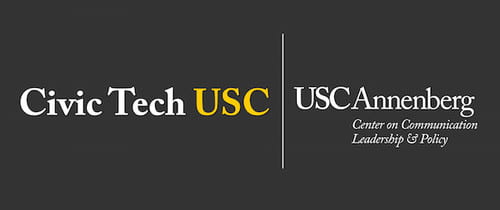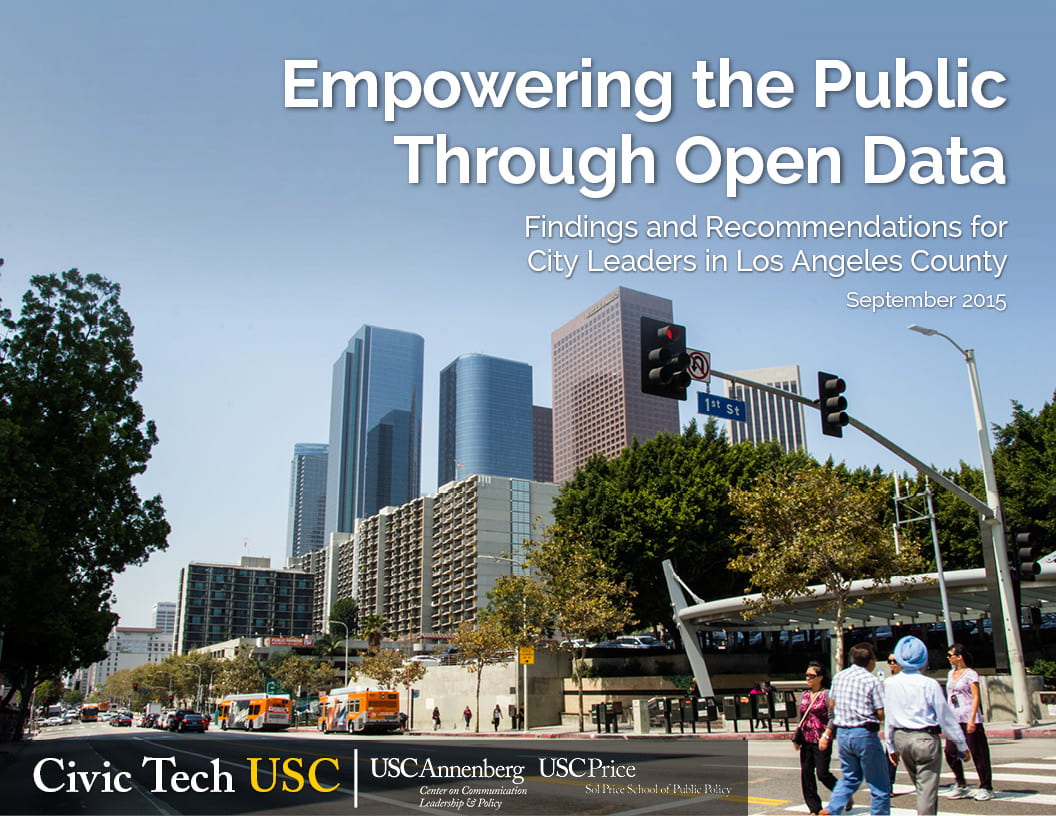Over the past year the Civic Tech USC research team here at the Center on Communication Leadership & Policy (CCLP) has been investigating what cities in Los Angeles County are doing to make their government data easily accessible to the public. Cities already collect vast troves of information, such as crime stats, budgets/financial expenditures, code violations, transportation stats, property information, campaign contributions, and more. Open data is a movement that has grown over the past few years to make all that information freely accessible in digital, machine-readable formats so that it can be used, modified, reused, and shared by anyone for any purpose. This, in turn, has the potential to increase transparency, encourage citizen participation, attract new business, and improve government efficiency.
We are pleased to present our comprehensive new report, Empowering the Public Through Open Data: Findings & Recommendations for City Leaders in Los Angeles County. The report contains findings and recommendations for city leaders and other open data advocates based on survey responses from 51 of the county’s 88 cities; in-depth interviews with officials from 10 local jurisdictions; a review of existing research about open data from academic, public, and private sectors; and criteria from the U.S. City Open Data Census.
By interviewing officials from 10 local jurisdictions and surveying 51 cities in LA County, we found that the Los Angeles area has quickly become a national leader in open data. Thirteen cities have already launched an open data initiative in some form, and new open data portals are constantly being launched. A majority of the cities they surveyed reported that open data was at least a moderate priority – if not a top priority – going forward. The City of Los Angeles ranks second (as of August 10, 2015) on the U.S. City Open Data Census, which ranks cities across 19 categories based on nine criteria such as whether they are available digitally, in bulk, and free of cost. Five other cities in LA County rank in the top 50. The City of Los Angeles also received platinum status for its open data from the World Council on City Data (WCCD), the certification body responsible for implementing the first international open data standards for cities (known as ISO 37120).
However, while significant progress has been made, cities can do more to expand the scope and usefulness their open data initiatives. For example, meaningful datasets related to important areas like criminal justice, health, and education have been mostly absent from discussions of open data. Police and court records that include demographic data could illuminate how certain groups are targeted with tougher enforcement and sentencing, and ultimately lead to policy changes that promote a fairer justice system. Cities like Ferguson and Baltimore (and Los Angeles) could greatly benefit from more transparency and accountability in this area.
Our report also found that city officials cite public trust and transparency as key motivators for creating open data initiatives, but cite the lack of funding as the biggest barrier to establishing or expanding their initiatives. Our report recommends that cities should pursue outside grants and other opportunities for funding, or get started with open data for minimal cost. Our report cites a number of examples and suggestions, such as Bloomberg grants and open source software.
City officials also reported that they do see benefits to open data initiatives, but in most cases there is still no clear measure of return on investment (ROI). Our report therefore recommends that cities should track and highlight open data success stories on the homepages of their open data portals in order to engage citizens to use the data. New York City’s portal features 20 different uses of the city’s portal to solve problems, but no LA area open data portals or city websites highlight apps that have been built, problems that have been solved, or other positive outcomes that have resulted from open data in those cities. Open data can increase transparency and improve accountability, but cities should also focus their open data initiatives on how data can be used to solve entrenched problems.
One of the biggest concerns about releasing government data is the privacy of individuals. City officials should treat the privacy of citizens as a top priority from the beginning of any open data initiative, and personal information should be removed from most city datasets before being released. The report tells the story of Chris Whong, a data analyst and civic hacker who in 2013 legally obtained a large dataset of every cab ride in New York City–over 173 million individual trips–through a request under New York State’s Freedom of Information Law (FOIL). Whong made a series of engaging and interactive maps using the data, and released the raw data so that other technologists and academics could use it to make their own visualizations and tools. The problem came because personal information had not been properly anonymized by the NYC Taxi & Limousine Commission before they released the dataset, which led to other users finding ways to reveal not only who the driver was for each trip, but also who the passenger was, how long their ride lasted, how much they paid, and where they were picked up and dropped off. The story resulted in criticism and negative press for New York City, and the lesson for cities is that they should ensure they are following best practices to effectively anonymize datasets before they are released.
Finally, our report recommends that a network of city officials across LA County who are advocates for open data in their cities and across the county should be established in order to share best practices and connect city officials, technologists, and civic hackers who have expertise in open data with those who are interested in launching an open data initiative but do not know where to start.
While open data initiatives are not a solution to all of the issues that impact modern cities, opening up government data can provide meaningful benefits to both city governments and the residents they serve. New apps and websites powered by open data continue to improve governments and the lives of citizens. Open data portals and initiatives help foster a culture of transparency and trust, and can provide new avenues to improve government efficiency, generate revenue, and create new jobs in the private sector.
Our report finds that cities across Los Angeles County are making progress on their open data efforts, and even those who haven’t made progress express substantial interest in pursuing open data initiatives. At the same time, city officials say that there are significant barriers to launching or expanding their open data efforts, including funding, expertise, and getting buy-in from city departments. By listening to their constituents and following the recommendations in our report, city officials and other open data advocates have the potential to overcome these challenges and create open data initiatives that make a difference in their communities.
In the coming months we hope to organize a summit for city officials from across the county to share best practices related to open data, and launch new investigations into areas like criminal justice to explore how such data might be collected and shared in more useful and impactful ways.

